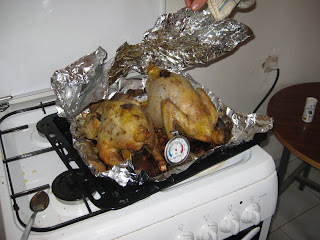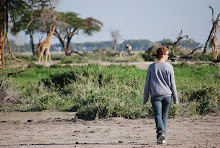Rockets were ignited; the sound deafening and chaos erupted in the streets of Dangila. There was a sigh of relief when I finally made it safely inside the gates of my compound as darkness fell around me. I stared for a moment at my red-stained hands and reflected on the pandemonium the day held.
I went to bed last night after double-locking my door and comforting my dog who was scared as small explosions popped loudly near my front door. Around 3am I awoke to silence and was thankful for the peace it brought me, but at 5am the noise was once again inescapable. I peered out my window and saw that fires were raging in the street and smoke filled the air. Time to join the celebration, I finally conceded!
Today was my first Meskel holiday spent in Dangila and it quickly had turned into my favorite. Ethiopia has a lot of obscure holidays, but most are celebrated in the same fashion: coffee ceremony, killing a sheep, eating injera. But Meskel proved to be a unique and wonderful reprieve from the monotony of holidays here.
Although the holiday is officially today, Monday, September 27, 2010 (Gregorian calendar, because let’s not forget we just rang in the year 2003 in Ethiopia), Meskel celebrations began yesterday. All over town cone-shaped bonfires were built and children anxiously ran amuck in the streets wanting to set fire to them. But their parents' warnings halted their pyro-instincts.
I visited neighbors’ houses all day yesterday, which officially started the holiday and the process of being over-fed. At one house, “the house of 5 girls” as I’ve labeled them, I came in just as the henna mixture was ready for application. I accepted the fact that my hand was going to get the same treatment as theirs without a word and enjoyed my girl-time with this wonderful family. As I sat there letting the henna dye my skin I thought about how majestic the henna dye looks on habesha hands, blending the natural golden brown skin on the back of the hand into a deep red palm. Then I looked at my pale hand and realized I’d inevitably look like a kid who stuck their hand in Georgia clay or Kool-Aid, but what could I do about it now?
Hands stuffed in my jacket pockets, I continued to visit neighbors and enjoy the atmosphere. I stopped to hangout with some children on my street for a while and they showed me their clever invention made from an old metal pipe and a nail all strung together with wire. If you scrape off the head of a match and put it in the pocket formed by pipe and nail, and slam it against a rock, it creates a loud POP sound. Some kids buy fifty sentim “rockets” which create a much louder effect, but using matches proved cheaper, so most kids opted for this method of being annoying.
The kids and I watched as parents built the bonfire tower out of wood and wrapped it in fresh evergreen branches which by the end resembled a Christmas tree by both sight and smell. They told me the bonfire would be lit at nine o’clock, which would normally translate immediately in my head (there is a six-hour difference), except for some reason 3am seemed an unfathomable meeting time and instead 9pm stuck. It wasn’t until 8pm, after I returned home from watching the Addis Ababa bonfire igniting on ETV and reminisced in my head about my Meskel spend there last year, that it clicked with me that the kids meant 3am! I immediately wanted to double-check because I wasn’t going to be the fool who wakes up in the middle of the night for nothing, but at this point I was home, in my pajamas, and safe from the raucous in the street. My final walk home just 30 minutes before was filled with dodging little boys running up with their fire-cracker invention and popping it at my feet; no way I was going back out.
I went to sleep cursing the children who kept throwing the rockets over my compound fence which would then explode in noise on my porch. At 3am I awoke without an alarm from a loud but comforting noise, rain pounding on my roof. The street itself was quiet though and I easily put my head back down to keep sleeping.
Around 5am was the next time I woke as children screamed with joy and rockets once again began their popping. I threw on a jacket and hurried outside, unsure what to expect. My neighbors happily greeted me and handed me a small bundle of sticks. The streets where pitch black except for bonfires ablaze on each block. My neighborhood’s bonfire was just about to be ignited and I joined in carrying the flame from an already burning fire to ours. We chanted yohey, yohey, yoho, yoho lead by an elder and danced in a circle around the Christmas tree-like structure, then we lit it with our bundles of sticks. The bonfire went up in a blaze and smoke from the green branches filled the air.
The kids and I watched as parents built the bonfire tower out of wood and wrapped it in fresh evergreen branches which by the end resembled a Christmas tree by both sight and smell. They told me the bonfire would be lit at nine o’clock, which would normally translate immediately in my head (there is a six-hour difference), except for some reason 3am seemed an unfathomable meeting time and instead 9pm stuck. It wasn’t until 8pm, after I returned home from watching the Addis Ababa bonfire igniting on ETV and reminisced in my head about my Meskel spend there last year, that it clicked with me that the kids meant 3am! I immediately wanted to double-check because I wasn’t going to be the fool who wakes up in the middle of the night for nothing, but at this point I was home, in my pajamas, and safe from the raucous in the street. My final walk home just 30 minutes before was filled with dodging little boys running up with their fire-cracker invention and popping it at my feet; no way I was going back out.
I went to sleep cursing the children who kept throwing the rockets over my compound fence which would then explode in noise on my porch. At 3am I awoke without an alarm from a loud but comforting noise, rain pounding on my roof. The street itself was quiet though and I easily put my head back down to keep sleeping.
Around 5am was the next time I woke as children screamed with joy and rockets once again began their popping. I threw on a jacket and hurried outside, unsure what to expect. My neighbors happily greeted me and handed me a small bundle of sticks. The streets where pitch black except for bonfires ablaze on each block. My neighborhood’s bonfire was just about to be ignited and I joined in carrying the flame from an already burning fire to ours. We chanted yohey, yohey, yoho, yoho lead by an elder and danced in a circle around the Christmas tree-like structure, then we lit it with our bundles of sticks. The bonfire went up in a blaze and smoke from the green branches filled the air.
Bonfires eventually turned into ashes and darkness turned into a beautiful sunrise. Corn was roasted on the remains of the fire and neighbors began their holiday celebration together in the street. The rest of today has been spent bouncing back and forth between neighbors to accommodate all the bunna invitations; there have been quite a few coffee ceremonies. Despite the number of cups of coffee I’ve had to drink today, the caffeine couldn’t overpower my four hours of sleep last night. What a wonderful holiday; it will end the only way a good Ethiopian celebration can end: with a deep sleep!












































